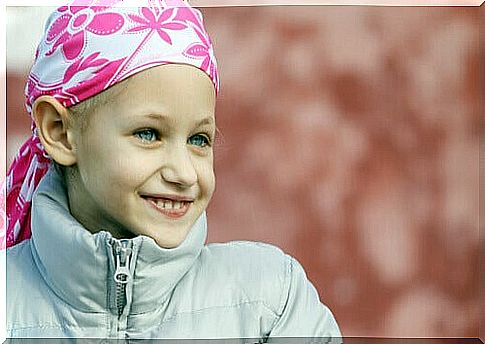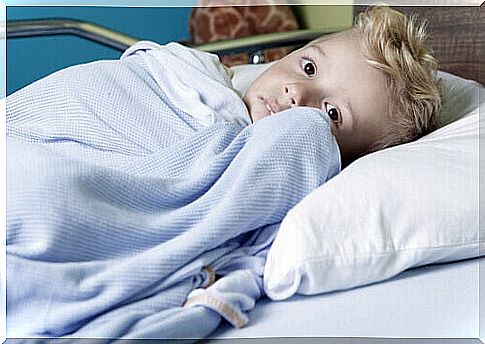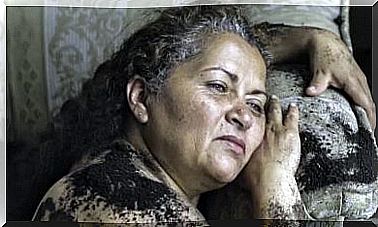Children With Cancer: How To Help Them Improve Their Quality Of Life

Every year, new cases of children with cancer are diagnosed. Fortunately medical advances are allowing your life expectancy to be longer. However, in addition to curing the disease, you need to pay close attention to other issues.
The side effects of cancer and treatments must be detailed. For this reason, it is important to gather the most effective psychological techniques to reduce them. In addition, it is important to know the most appropriate interventions to reduce anxiety and depression problems that children may have. Without forgetting the improvement in their quality of life, both during the disease process and after it is overcome.
Children with cancer: the impact of the disease
The child suffers from both physical and psychological symptoms. Among the physical symptoms we can highlight vomiting, weight loss, fatigue, etc. On an emotional level, children with cancer face feelings such as anger, fear, loneliness or anxiety.
Depending on the age at which the diagnosis is made, the disease manifests itself in one way or another. In younger children with cancer, the concern with pain and the fear of separating from their parents is highlighted. In larger ones, feelings of loneliness begin to emerge. Adolescents fear dying and stress related to physical changes.

It is true that points in common also appear. Pain is one of the most frequent anxieties. Such pain can come from the disease itself or appear due to medical procedures. For example, bone marrow aspiration and biopsy are very painful and frequent procedures during the intervention.
Children with cancer should also be exposed to procedures such as radiotherapy, chemotherapy or blood draws, which are considered more painful than the disease itself. In addition, sleep disorders, fatigue, anxiety problems, depressive symptoms and problems in your social relationships are also quite common.
Psychological intervention in children with cancer
Receiving the diagnosis has a very strong psychological impact on the family. After that, the question arises whether or not we should inform the child. In these cases, consulting an expert about what to do and how to do it can help both the family and the child.
The effects of the disease, the characteristics of the treatment and its evolution, together with the feeling of uncertainty, often give rise to many questions that need to be answered. Psychological intervention can help find them, or learn to handle situations that arise.
Below we list a series of treatments that have demonstrated their effectiveness on several occasions. To make it easier for you to understand, we have separated the main symptoms we talked about earlier with their main treatments.
- Reduction of nausea and vomiting: progressive muscle relaxation with guided imagery, hypnosis and systematic desensitization.
- Pain Management: Distraction, Use of Imagination, Relaxation/Breathing Training, Positive Reinforcement, Music Therapy, and Hypnosis.
- Fatigue reduction: distraction and planning activities according to your priority.
- Treatments for anxiety: relaxation and breathing techniques, visualization of pleasant scenes, reinforcement of appropriate behaviors, differential reinforcement and positive verbalizations.
- Treatments for depression: emotional education, enjoyable activities and cognitive restructuring.
Adapting to a new life after overcoming cancer
The current survival rate for children with cancer is almost 80%. A hopeful piece of information that aspires to reach 100% thanks to advances in different types of treatment. But what does it really mean to be a survivor of a cancer disease?
Cancer is a disease that is characterized, among other things, by long periods of hospitalization. Children stop going to school, contact with their peers or teachers and abroad is minimal. This makes your social circle shrink and when it’s time to re-incorporate, there are some difficulties.

Going back to school, for example, is a complex process. Both children and their parents express fears. On the one hand, children do not want to separate from their parents and may have certain concerns about changes in their body image (alopecia, amputations, etc.). On the other hand, parents express fear that their children will be rejected by peers and of the contagion of diseases that affect the child’s health again.
In these cases, it is recommended that you provide useful information to the child and the whole family, but also to the teachers who will be responsible for the situation. Re-embedding is an adaptation process that takes time.
Interventions such as holding meetings with school personnel to provide information about the illness and treatment, conducting preliminary activities to prepare the child for their return to school, or conducting presentations for the rest of the students to understand the illness and the needs of the coming child has been showing effectiveness.
In conclusion, through psychological help and without forgetting the multidisciplinary intervention with other professionals, we can ensure that children with cancer and their families obtain a better quality of life during this difficult process.









